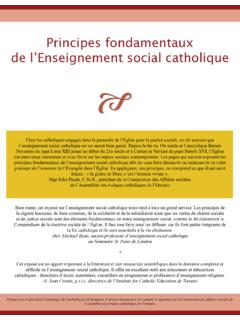Transcription of Grade 7, Theme Three - Assembly of Catholic …
1 Grade 7, Theme Three Dear Family, We are ready to begin Theme Three of Fully Alive, our family life program. Because the partnership of home, church, and school is so important, this letter is written to let you know what we talk about in class, and to offer some ideas for your involvement. For more information, please go to www. About Theme Three Theme Three of Fully Alive is called Created Sexual: Male and Female. God made us male and female, and all of God s creation is good. In earlier grades, this Theme was presented through a continuing story, which emphasized God s plan for new life as the result of the love of mothers and fathers. In later grades, the message is unchanged, but the approach is more direct.
2 As students enter puberty, they need to know about the changes they will experience, and about the responsibilities of being created male and female and following God s plan for them. In Theme Three we will: examine some aspects of sexuality, including sexual characteristics, sexual identity and sexual roles. review the changes of puberty and the development of male and female fertility. explore the responsibility of caring for our health, including sexual health, and of developing a realistic body image during adolescence. discuss the experience of sexual attraction and feelings, and examine the need for self-discipline and patience to reach the goal of becoming fully mature males and females.
3 Learn about the virtue of chastity and the attitudes and behaviours that reflect this virtue and show respect for the gift of sexuality. Looking Ahead New terms introduced in Theme Three are this Grade level are: primary sexual characteristic, secondary sexual characteristic, sexual role, femininity, masculinity, sexually transmitted infection (STI), homosexuality, masturbation, pornography This Theme introduces the experience of sexual attraction and sexual feelings, which begin after puberty, and stresses the need for self-discipline to manage these feelings. Sexual orientation is briefly discussed as part of a discussion of passing attractions young people may have toward people of the same sex.
4 The virtue of chastity is highlighted in this Theme , and the serious moral, physical, and emotional risks of intimate sexual relationships between unmarried people are carefully explored. The students are encouraged to recognize the value of the goal of becoming fully mature males and females who follow God s plan for them. In Grade 8 the students will learn more about sexual orientation, natural family planning, and artificial contraception from the perspective of Catholic moral teaching. Working together at school and at home You may find your child less open to talking about sexuality at this stage of life. Unlike younger children, young adolescents consider the topic very personal, and often prefer not to talk about it.
5 Look for natural openings a television program you watched together, an incident involving a friend that your child tells you about, or an item in the news and try to take advantage of them. Young adolescents tend not to pay enough attention to nutrition, exercise, and rest. These areas of physical health are especially important when people are growing rapidly. Many young people spend too much time in sedentary pursuits (television, electronic games, surfing the net). Families can make a difference by participating in a variety of physical activities, and including friends of their children. The presence of friends makes a big difference to children of this age.
6 Preoccupation with appearance and weight is normal for this age group, especially for girls. It is important to be patient with young people s worries or dissatisfaction about their bodies, and reassure them that everyone is sensitive during this stage of life, that these feelings do ease as they get older. At school the students discussed the influence of media on young people s body images. You might ask your child about this discussion. As part of the discussion of sexual attraction, the topic of pornography was briefly discussed. The internet has made access to pornography widely available. When young people have access to the internet in their bedrooms, there is always a risk that they will get involved in chat rooms that are inappropriate for people of their age or watch pornography.
7 This is a topic that parents do need to talk about. At school the students discussed the harmful nature of pornography, particularly for young people who should be directing their energies toward greater maturity and self-discipline, not to a distorted version of sexuality. This year, each Theme ends with a reflection on one of the virtues. For Theme Three the virtue is modesty. Ask your child to tell you about this virtue. In school we discussed modesty as the virtue that protects our dignity as persons, especially that which is private and intimate, and guides the way we present ourselves and behave. Theme Three Topics .. male and female he created them.
8 Genesis 1:27 In Grade 7, Theme Three is developed through five topics. The opening topic provides an opportunity for the students to consider sexuality as a fundamental dimension of human identity, and to examine aspects of what it means to be created male and female. Topics 2 and 3 include a review of basic information about development at puberty, and explore the responsibility to be a good steward of oneself, as a body/spirit person. Topic 4 provides the students with some information about sexual attraction and feelings, including a brief discussion of same-sex attraction. The final topic looks at the need for respect for the gift of being created male and female, and their responsibility to follow God s plan for sexuality.
9 Theme Three Virtue The virtue of modesty is highlighted in Theme Three . In the present social environment, this virtue is often seen as old-fashioned. In this Theme , modesty is presented as the virtue the protects our dignity as persons, especially that which is private and intimate. Modesty guides the way we present ourselves and behave. This is the reflection on the virtue of modesty from the student text. The Virtue of Modesty Blessed are the pure of heart, for they will see God. (Matthew 5:8) Modesty is the virtue that protects our dignity as persons, and guides the way we present ourselves and how we behave. A modest person does not seek attention, boast, dress in a provocative way, or reveal personal information inappropriately.
10 Many people think of modesty as an old-fashioned virtue. In particular, they associate it with the way young people dress. In the not-so-distant past, clothing that displayed much of the body was judged to be immodest. Some of today s fashions low-cut necklines, bare midriffs, and skin-tight jeans and t-shirts would have been considered shocking for both males and females. But modesty is much more than a matter of dress. Most of all, it is the habit of protecting that which is, for each person, private and intimate. Modest people: don t dress in a way designed to display the body, or post revealing photos of themselves on the internet. Why not? Because we are body/spirit persons created in God s image, and both the female and male body are worthy of respect, not things to be exhibited.









